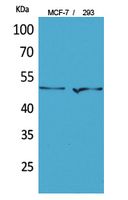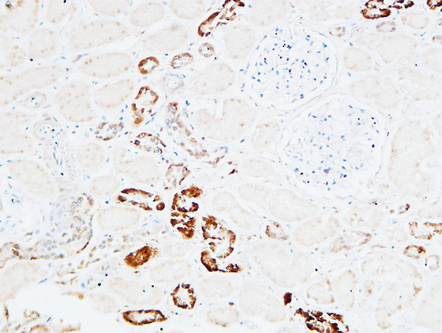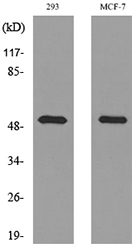PD-ECGF Polyclonal Antibody
- Catalog No.:YT5414
- Applications:WB;IHC;IF;ELISA
- Reactivity:Human;Rat;Mouse;
- Target:
- PD-ECGF
- Fields:
- >>Pyrimidine metabolism;>>Drug metabolism - other enzymes;>>Metabolic pathways;>>Nucleotide metabolism;>>Bladder cancer
- Gene Name:
- TYMP
- Protein Name:
- Thymidine phosphorylase
- Human Gene Id:
- 1890
- Human Swiss Prot No:
- P19971
- Mouse Gene Id:
- 72962
- Mouse Swiss Prot No:
- Q99N42
- Rat Gene Id:
- 315219
- Rat Swiss Prot No:
- Q5FVR2
- Immunogen:
- The antiserum was produced against synthesized peptide derived from the N-terminal region of human TYMP. AA range:11-60
- Specificity:
- PD-ECGF Polyclonal Antibody detects endogenous levels of PD-ECGF protein.
- Formulation:
- Liquid in PBS containing 50% glycerol, 0.5% BSA and 0.02% sodium azide.
- Source:
- Polyclonal, Rabbit,IgG
- Dilution:
- WB 1:500 - 1:2000. IHC: 1:100-1:300. ELISA: 1:20000.. IF 1:50-200
- Purification:
- The antibody was affinity-purified from rabbit antiserum by affinity-chromatography using epitope-specific immunogen.
- Concentration:
- 1 mg/ml
- Storage Stability:
- -15°C to -25°C/1 year(Do not lower than -25°C)
- Other Name:
- TYMP;ECGF1;Thymidine phosphorylase;TP;Gliostatin;Platelet-derived endothelial cell growth factor;PD-ECGF;TdRPase
- Observed Band(KD):
- 50kD
- Background:
- This gene encodes an angiogenic factor which promotes angiogenesis in vivo and stimulates the in vitro growth of a variety of endothelial cells. It has a highly restricted target cell specificity acting only on endothelial cells. Mutations in this gene have been associated with mitochondrial neurogastrointestinal encephalomyopathy. Multiple alternatively spliced transcript variants have been identified. [provided by RefSeq, Apr 2012],
- Function:
- catalytic activity:Thymidine + phosphate = thymine + 2-deoxy-alpha-D-ribose 1-phosphate.,disease:Defects in TYMP are the cause of mitochondrial neurogastrointestinal encephalomyopathy (MNGIE) [MIM:603041]; also known as myoneurogastrointestinal encephalomyopathy. MNGIE is an autosomal recessive disease associated with multiple deletions of skeletal muscle mitochondrial DNA (MtDNA). It is clinically characterized by onset between the second and fifth decades of life, ptosis, progressive external ophthalmoplegia, gastrointestinal dysmotility (often pseudoobstruction), diffuse leukoencephalopathy, thin body habitus, peripheral neuropathy, and myopathy.,function:Catalyzes the reversible phosphorolysis of thymidine. The produced molecules are then utilized as carbon and energy sources or in the rescue of pyrimidine bases for nucleotide synthesis.,function:May have a role in maintaining the in
- Subcellular Location:
- cytosol,
- Expression:
- Brain,Lung,Placenta,Synovial membrane tissue,
- June 19-2018
- WESTERN IMMUNOBLOTTING PROTOCOL
- June 19-2018
- IMMUNOHISTOCHEMISTRY-PARAFFIN PROTOCOL
- June 19-2018
- IMMUNOFLUORESCENCE PROTOCOL
- September 08-2020
- FLOW-CYTOMEYRT-PROTOCOL
- May 20-2022
- Cell-Based ELISA│解您多样本WB检测之困扰
- July 13-2018
- CELL-BASED-ELISA-PROTOCOL-FOR-ACETYL-PROTEIN
- July 13-2018
- CELL-BASED-ELISA-PROTOCOL-FOR-PHOSPHO-PROTEIN
- July 13-2018
- Antibody-FAQs
- Products Images

- Western Blot analysis of MCF-7, 293 cells using PD-ECGF Polyclonal Antibody. Secondary antibody(catalog#:RS0002) was diluted at 1:20000

- Immunohistochemical analysis of paraffin-embedded Human kidney. 1, Antibody was diluted at 1:200(4° overnight). 2, High-pressure and temperature EDTA, pH8.0 was used for antigen retrieval. 3,Secondary antibody was diluted at 1:200(room temperature, 30min).

- Western blot analysis of lysate from 293, MCF-7 cells, using TYMP Antibody.



